Search Results
Search
Filter results
Advanced Filters
Your search returned 562 Solutions
-
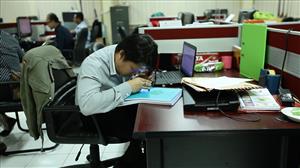
A variety of approaches to create jobs for people with visual impairments
The first phase started in 2007 and focused on technology to increase the learning potential of students with visual impairments. From 2012 to 2013, the emphasis was on vocational preparation, technological applications and advocacy for inclusive universities. 117 people found employment through the programme.
ICEVI - International Council for Education of People with Visual Impairment, Nippon Foundation Higher Education Project, Cambodia -
MoMA has won international respect for their unique efforts to make their extensive resources, collection and
programs accessible to visitors with disabilities. Training on inclusive arts education is given to external institutions worldwide and disability awareness and equality training is delivered in-house.
MoMA is committed to providing the most inclusive environment for its diverse visitors. The Access Program offer a variety of programs for visitors with different disabilities. Access Program staff have developed training resources on providing quality art experiences and delivered workshops throughout the world.
MOMA - Museum of Modern Art, Inclusive art education at the MoMA, New York, United States of America -
Empowerment youth through storytelling and digital media in sub-Saharan Africa
Tai Tanzania: Offers non-formal education with digital media and storytelling. Addresses issues such as albinism and autism. Utilises YouTube, school classes, radio and TV stations and other NGOs to disseminate information.
Pamoja (Inclusive) Project, Tanzania -
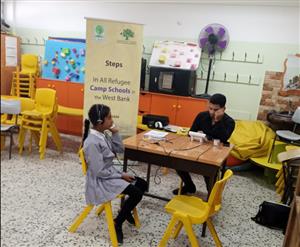
Providing hearing and seeing aids paired with inclusive education in refugee camps
PCCDS, Hebron: Improves educational outcomes for students with hearing and visual disabilities. Provided hearing aids and glasses, increasing completion rates from 27% to 59%.
Support programme for young people with visual or hearing disabilities, Palestine -
Placing teachers with disabilities in regular schools
The programme places teachers with disabilities in regular schools, supported by assistant teachers. While the focus was initially on visually impaired people, the initiative has now been extended and reaches out to persons with other disabilities as well. Between 2014 and 2016 more than 34 jobs were created.
Lesothian Ministry of Education and Training, Lesotho -
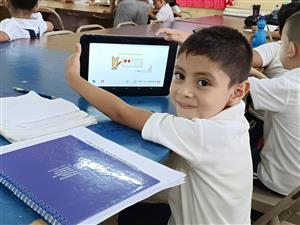
UNICEF’s accessible digital textbooks for children with and without disabilities
UNICEF’s Accessible Digital Textbooks Initiative: Provides digital textbooks with audio narration and integrated sign language. By 2023, deployed in nine countries, benefiting over 2,500 students globally, with 66 prototypes developed.
Accessible Digital Textbooks (ADT) initiative, Colombia -
Inclusive Education for Cambodian children who are blind or deaf
The project offers extra classes for children with visual or hearing impairments to enable them to attend mainstream schools. During the extra lessons students are prepared to follow regular classes by making use of special learning materials in Braille and sign language. The project also created the Khmer Braille and Khmer Sign Language.
Krousar Thmey Foundation, Cambodia -
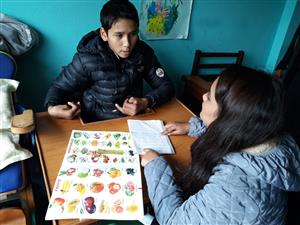
Promoting community-based Inclusive Education
Sama Nepal focuses on a "base school", which includes a care centre and/or a resource class in which children with special needs are enrolled. From there they participate in mainstream school activities according to their abilities. From 2016 to 2019, 222 children with disabilities have benefited from this support.
Sama Nepal, Including children with disabilities in mainstream schools in Nepal, Nepal -
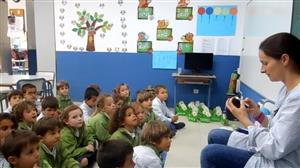
Noise-free school model inclusive of students with hearing impairments
Classrooms at Tres Olivos School are built with sound-absorbing materials and equipped with sound-level meters. The school has 98 teachers (including seven speech therapists and two deaf teachers) and 1,100 students who are educated from early childhood to high school and also in two vocational trainings.
Dales la Palabra Foundation, Tres Olivos School, Spain -
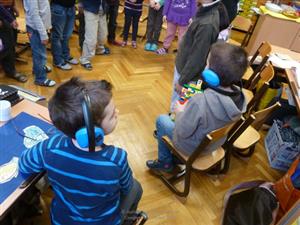
A municipal-level pilot-project towards continuous schooling of children with autism
In this pilot-project children with autism are accompanied from kindergarten onwards by trained teachers and by mentors who also assist parents with out-of-school issues. In school, special learning materials and mentors working with regular teachers are provided to facilitate the inclusion of children with autism.
Vienna Board of Education, Children with autism pilot-project, Austria
- Page 1
- Page 2
- Page 3
- Page 4
- Page 5
- Page 6
- Page 7
- Page 8
- Page 9
- Page 10
- Page 11
- Page 12
- Page 13
- Page 14
- Page 15
- Page 16
- Page 17
- Page 18
- Page 19
- Page 20
- Page 21
- Page 22
- Page 23
- Page 24
- Page 25
- Page 26
- Page 27
- Page 28
- Page 29
- Page 30
- Page 31
- Page 32
- Page 33
- Page 34
- Page 35
- Page 36
- Page 37
- Page 38
- Page 39
- Page 40
- Page 41
- Page 42
- Page 43
- Page 44
- Page 45
- Page 46
- Page 47
- Page 48
- Page 49
- Page 50
- Page 51
- Page 52
- Page 53
- Page 54
- Page 55
- Page 56
- Page 57